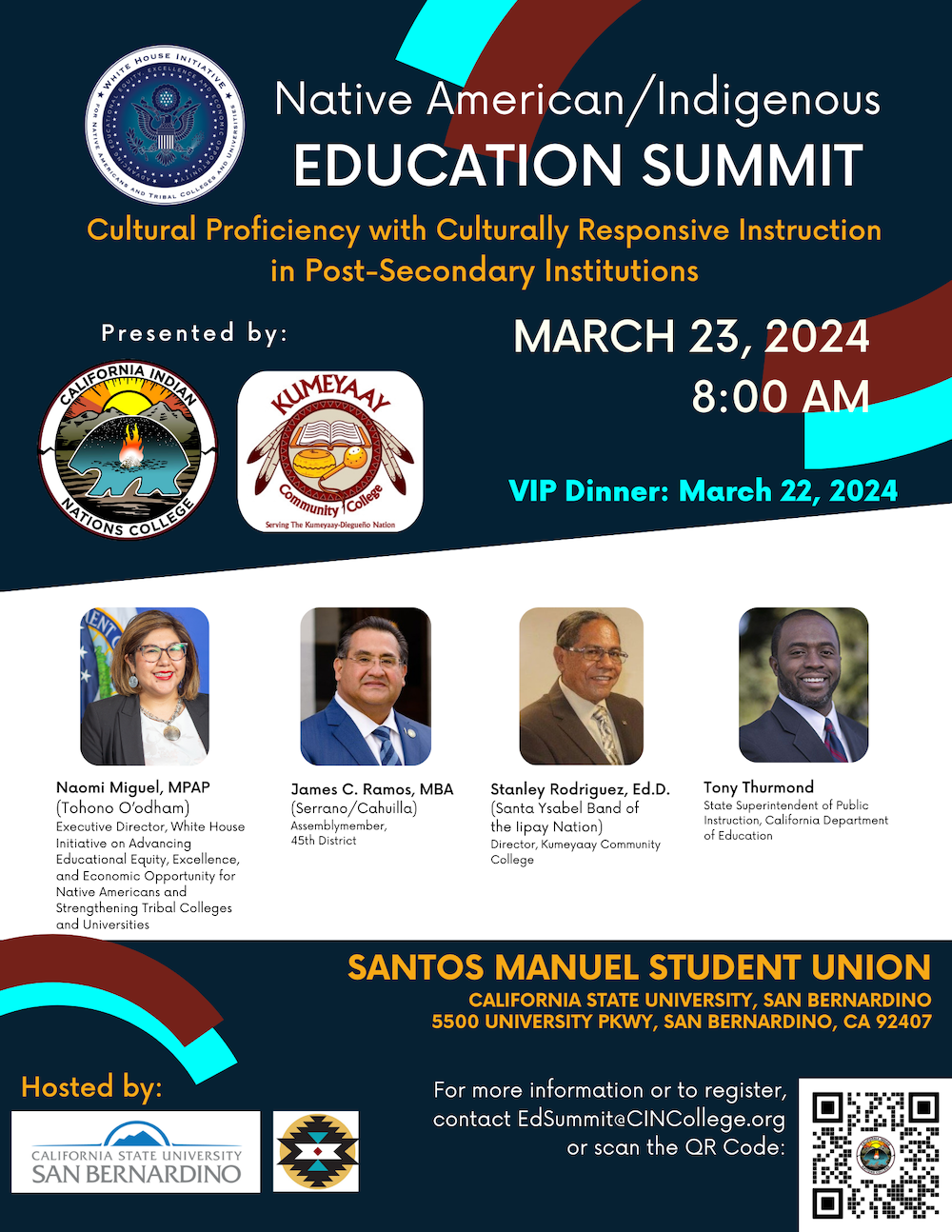2024 Native American / Indigenous Education Summit
“The State of Indian Education in California and Beyond,” “Why Aren’t There More? The Challenges to Starting a Tribal College,” “Why Tribal Colleges Play a Vital Role in Empowering Native Communities”
The Education Summit is scheduled for Saturday, March 23, 2024 at 8:00 AM at California State University, San Bernardino.
The VIP Dinner is scheduled for Friday, March 22, 2024 at 4:00PM at California State University, San Bernardino.
For more information, please contact EdSummit@CINCollege.org.
Background:
The Education Summit is an inaugural event to host conversations with state, federal, and tribal governments to take the reins and redirect the evolution of American Indian post-secondary education. Research continues to claim American Indian students fall below the nation’s post-secondary achievement gap and represent less than one percent (<.01%) of students in higher learning. Postsecondary National Policy Institute (2022) reported American Indian students:
- totaled 0.06% of all post-secondary enrollment with 83% of those individuals attending public institutions, experiencing higher drop rates than the general U.S. population.
- 22% of 18-24-year-old American Indian students are enrolled in college compared to 40% of the overall U.S. population.
- 15.4% of Native Americans over the age of 25 had earned a bachelor’s degree or higher, short of the 32.9% overall U.S. population.
Research further contends:
- American Indian students attending a “tribal college or university (TCU)” are four times more likely to receive a bachelor’s degree than those who enroll in mainstream universities.
- Among University California (UC) and California State University (CSU)-eligible students, American Indian student enrollment rates are 10% lower than White students and 4% lower than African American students.
- Even more alarming, among low-income students, American Indian students are 18% less likely to be eligible for college admissions than their White peers; again, experiencing more college dropouts with lower academic attainment and persistence.
(Brayboy et al., 2015; Bryan, 2019; Chee et al., 2019; Davis, 1992; Guillory et al., 2008; May & McDermott, 2021; Minthorn & Shotton et al., 2018)
Purpose:
This Education Summit aims to address the responsibility to examine institutional operations, pedagogical commitments, and cultural responsivity to address the voices and needs of American Indian and Indigenous students in post-secondary access, inclusivity, and preparedness. State, federal and tribal governments need to ask: What are we doing to support this ongoing need for our American Indian students seeking post-secondary educational attainment and to address the academic achievement gaps?
This Education Summit currently includes Ms. Naomi Miguel, Executive Director, White House Initiative on Advancing Educational Equity, Excellence, and Economic Opportunity for Native Americans and Strengthening Tribal Colleges and Universities; and Superintendent Tony Thurmond from the California Department of Education. Also, to include: Assemblymembers, Tribal Chairs, Native Educators, and Native students. As we recognize the value of student and tribal voices to discuss the urgency and challenges faced in post-secondary education.
The areas of focus are Equity, Access, and Inclusion; and discussions will include and are not limited to:
- Census & Identity
- Cultural Responsivity (Curricula & Student Services)
- Equitable Access to Higher Education

